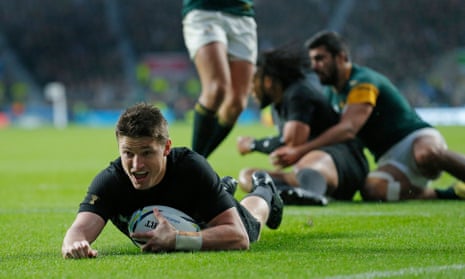It was typical of the British weather to arrive after the European teams had been knocked out of the World Cup. The result was a hard, uncompromising wrestling bout that was more Six Nations than Rugby Championship; the holders finding a way of winning ugly and keeping alive their ambition of becoming the first side to retain the trophy.
For all the talk in the past week about gaps and a right and a wrong way of playing, it is all about finding a winning way in tournament rugby and New Zealand, despite having their polish rubbed off by limited, but single-minded opponents, found something from deep within to reach successive finals for the first time.
There was a moment towards the end of the first half when the camera panned to the New Zealand coach, Steve Hansen. He was wearing an expression that suggested someone had just asked him which dressing room he fancied on Friday night for the bronze final at the Olympic Stadium. The All Blacks were losing 9-7 despite scoring an early try after breaching South Africa’s defence with surprising ease. Worse was to come when the try scorer, Jerome Kaino, was sent to the sin-bin for a lapse of discipline, kicking the ball away from a ruck as he chugged back from a tackle. It reflected the unease the World Cup holders felt at having their stronghold, the breakdown, stormed.
The All Blacks may have been the No1 team in the world rankings for most weeks since the system started at the turn of the century, but trailing by five points at half-time with eight minutes a man down to follow, they looked anything but champion. They have had an ability through the years and decades of being able to solve problems as they arise, but as South Africa used their back row to make every breakdown a fierce scrap, the senior All Blacks did not lead by example.
Kieran Read, Richie McCaw, Ma’a Nonu and Kaino, who all played in the 2011 World Cup final, conceded the four penalties Handré Pollard kicked in the opening half, forced by the Springboks to hold on too long in the tackle as ball-runners became isolated or handle on the floor to prevent a turnover. They conceded nine penalties in the opening period, finishing it looking ragged if not in disarray, looking for answers, McCaw, coming round the side of a ruck, fortunate a swinging arm only glanced off the top of Francois Louw’s head rather than catching him flush in the face.
Whatever Hansen said at half-time did not last long. His players were back on the field five minutes before the start of the second half, going through handling and passing drills as the rain fell. It was not quite a Phil Brown moment, but the game changed. By the time Kaino returned, Daniel Carter had reduced the deficit to two points with a 40-metre drop goal and a key substitution had been made.
This article includes content hosted on player.performgroup.com. We ask for your permission before anything is loaded, as the provider may be using cookies and other technologies. To view this content, click 'Allow and continue'.
Nehe Milner-Skudder, the wing who had been targeted by South Africa under the high ball, had sidestepped his way over the gain line a few times on the night, but the deteriorating conditions made adventure more risky. After he was treated, having been taken out off the ball by Habana, he was replaced by Beauden Barrett, an outside-half by trade but here shifted to full-back, whose first act was to place a chip in behind the defensive line and his second, after three minutes on the field, was to score a try in the corner.
New Zealand’s two tries showed a difference between them and South Africa. They came from the ability of backs and forwards to handle, run and pass; the prop Joe Moody, the second row Sam Whitelock and McCaw were involved in the first five minutes after Pollard had given the Springboks the lead with the first of his five penalties, while all the pack seemed to be involved in the build-up to Barrett’s try, which was set up by Nonu who kept tacklers in doubt about his intentions until Barrett had a clear run to the line.
South Africa, for all the pressure they exerted and the width they tried to achieve, rarely threatened New Zealand’s line. Jess Kriel and Damian de Allende made breaks from midfield and Willie le Roux threatened, but there was no Nonu or Conrad Smith to time a pass and no Carter to take the game by its painful bits and squeeze hard, as he did in the second period.
Carter is playing in his fourth World Cup, a tournament that had been unkind to him before this year, premature elimination through injury or defeat. He has always played with a detached calm, as if on a slightly higher level than those around him, but he was on the floor with everyone else as South Africa played the game on their terms, but in the second 40 minutes he had a sniper’s ruthlessness and accuracy.
South Africa at least found atonement, ending the tournament as they started, with a two-point defeat, but if they could take nothing from the opening weekend loss to Japan except insults and advice, here honour left in their kit bag. All any coach can ask is that his players give him everything and the Springboks left nothing behind, playing from the start with a ruthless, controlled ferocity, but in the moments that the contest became about skill rather than physicality, the point where it became the Rugby Championship rather than the Six Nations, they were adrift and it provides their starting point for the new year. The All Blacks have a date with destiny before then, history men in the making.

Comments (…)
Sign in or create your Guardian account to join the discussion